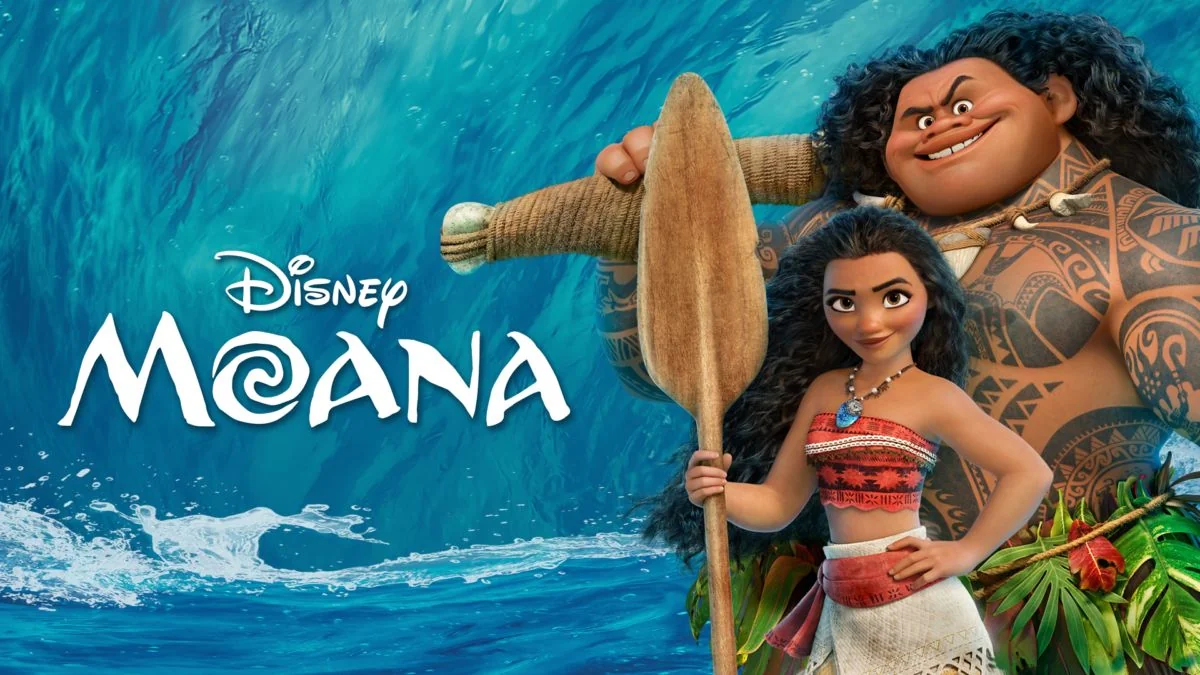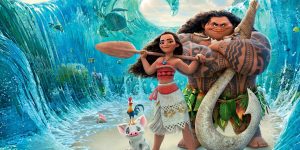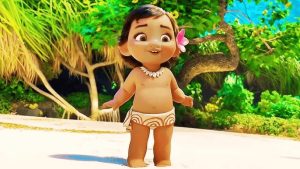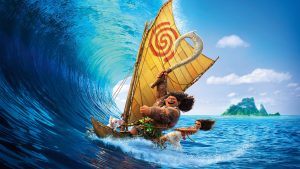“Moana (2016)”

“Moana” (2016) is a Disney animated musical film directed by Ron Clements and John Musker, featuring a screenplay by Jared Bush. It follows the journey of Moana Waialiki (voiced by Auli’i Cravalho), a young Polynesian girl who sets out on a daring adventure to save her island and discover her true destiny. The film is a celebration of Polynesian culture, myth, and the spirit of exploration, offering themes of self-discovery, bravery, and environmental stewardship.
Plot Summary
The story begins in the Polynesian island of Motunui, where Moana, the daughter of the island’s chief Sina (Nicole Scherzinger) and Chief Tui (Temuera Morrison), is raised with the expectation that she will one day take over her father’s leadership role. However, Moana feels drawn to the sea, a calling that her father discourages due to the dangers it presents. Her island, once abundant with resources, is starting to suffer from environmental decline, and Moana is beginning to question the limits imposed on her by tradition.
The story takes a pivotal turn when Moana learns that Te Fiti, an island goddess, once gave the world life through the heart-shaped stone known as the Heart of Te Fiti. Long ago, the heart was stolen by the demigod Maui (Dwayne Johnson), which set off a series of destructive events, including the decline of nature’s balance. In an effort to restore harmony, Moana must retrieve the Heart of Te Fiti, so she sets off on a perilous ocean voyage to find Maui and convince him to return the heart and restore the world’s natural order.
During her journey, Moana faces numerous challenges, including navigating the vast ocean, dealing with her self-doubts, and confronting Maui, who is initially reluctant to help. The film is both a physical and emotional journey, as Moana discovers her inner strength and leadership qualities, learning to embrace her destiny as a navigator and a leader.
Key Themes
- Self-Discovery and Destiny: A major theme in Moana is the journey of self-discovery. Moana, initially uncertain about her role and responsibilities, learns to embrace her heritage, skills, and leadership potential. The film encourages young viewers to seek out their own paths, trust in their abilities, and never shy away from challenges.
- Cultural Identity and Heritage: Moana strongly highlights Polynesian culture, particularly the traditions of navigation and the importance of environmental stewardship. Moana’s journey is not only about finding her true calling but also about honoring and preserving the wisdom and values passed down through generations.
- Environmentalism and Responsibility: The film’s portrayal of the island’s declining resources is a subtle yet powerful commentary on environmental issues. It emphasizes the need to protect nature and live in harmony with the Earth. Moana’s quest to restore the Heart of Te Fiti serves as a metaphor for restoring balance and respecting the natural world.
- Bravery and Leadership: Moana’s transformation from a rebellious teenager to a courageous leader is central to the narrative. Throughout her journey, she learns to be resourceful, confident, and independent. She discovers that leadership is not about authority but about responsibility, sacrifice, and the willingness to stand up for what’s right.
- The Power of Friendship and Teamwork: Although Moana’s journey is a personal one, she also learns the value of friendship and working together. Maui, though initially antagonistic, becomes her ally, and the two grow and learn from each other. Moana also relies on her family’s wisdom and support, especially from her grandmother Gramma Tala (Rachel House), who is her guiding spirit.
Character Development and Performances
- Moana (Auli’i Cravalho): Moana is a strong, independent, and curious character who defies tradition to find her true path. Auli’i Cravalho’s voice performance brings warmth, depth, and determination to Moana, making her an inspiring role model for young audiences. Moana’s arc is one of growth, as she transitions from being unsure and constrained by others’ expectations to becoming a confident and capable leader.
- Maui (Dwayne Johnson): Maui, the shape-shifting demigod, is both comic and complex. Initially, he is self-absorbed and reluctant to help Moana, but over time, he reveals the vulnerability beneath his bravado. Dwayne Johnson’s performance is charismatic, and Maui’s emotional journey, including his feelings of guilt and insecurity, adds depth to the character. Maui’s redemption arc also highlights the importance of humility and self-acceptance.
- Chief Tui (Temuera Morrison) and Sina (Nicole Scherzinger): Moana’s parents represent the two sides of her internal conflict. Chief Tui is protective and conservative, while Sina encourages Moana to follow her heart. Both characters love their daughter deeply but have different views on her future, creating tension but also emphasizing the importance of parental love and support.
- Gramma Tala (Rachel House): Gramma Tala serves as Moana’s spiritual guide, providing wisdom and encouragement throughout the film. Rachel House’s voice acting brings a sense of warmth and wisdom to the character, making her an important source of Moana’s strength and inspiration.
Music and Songs
The music of Moana is one of the film’s standout features. The score was composed by Opetaia Foa’i, Lin-Manuel Miranda, and Mark Mancina. The soundtrack features several catchy and powerful songs, including:
- “How Far I’ll Go”: Moana’s signature song, expressing her desire for adventure and her yearning to explore beyond the island. This song became one of the film’s most iconic tracks and was nominated for an Academy Award for Best Original Song.
- “You’re Welcome”: A fun, energetic song performed by Maui (voiced by Dwayne Johnson) in which he sings about his accomplishments and why he deserves admiration. It’s a humorous and catchy track that became a fan favorite.
- “We Know the Way”: A powerful and rhythmic song that captures the spirit of Polynesian culture and Moana’s connection to her ancestors.
- “I Am Moana (Song of the Ancestors)”: A powerful, emotional ballad where Moana fully embraces her role as the leader of her people. It marks her transformation into a confident and self-assured individual.
The music perfectly complements the story’s themes of self-discovery, adventure, and cultural pride, adding emotional weight to key scenes.
Visuals and Animation
The animation in Moana is visually stunning, with vibrant, colorful landscapes that bring the Polynesian islands to life. The water animation is particularly noteworthy, with the ocean often depicted as a sentient and playful character. The film’s visual style blends realistic depictions of nature with stylized fantasy elements, making the world of Moana feel both grounded and magical.
The characters are well-designed, with expressive features and dynamic movements that reflect their personalities. The design of Maui, with his tattoos and shape-shifting abilities, is especially detailed, and the animation team’s attention to cultural accuracy and detail is evident in the portrayal of the islanders’ clothing, rituals, and customs.
Reception and Legacy
Moana was met with widespread critical acclaim for its animation, music, voice performances, and empowering themes. It grossed over $640 million worldwide and became a cultural phenomenon, particularly for its representation of Polynesian culture, which was a central part of its success. The film was praised for breaking away from traditional Disney princess tropes by featuring a heroine who is not seeking romance but instead is focused on adventure, leadership, and self-discovery.
The film was nominated for two Academy Awards: Best Animated Feature and Best Original Song for “How Far I’ll Go,” and it won several other awards, including Golden Globe and Annie Awards.
Moana also left a lasting impact on the representation of indigenous cultures in mainstream Hollywood films, with many praising Disney for its respectful portrayal of Polynesian traditions, myths, and beliefs. The film’s message of following your heart and protecting the environment resonates with audiences of all ages.
Fun Facts
- Cultural Consultants: Disney worked closely with cultural experts, including Polynesian navigators, historians, and consultants, to ensure the film accurately represented the culture and history of Polynesia.
- Auli’i Cravalho’s Debut: Auli’i Cravalho, who voiced Moana, was just 14 years old when she was cast in the role, making her one of the youngest Disney leads at the time.
- Lin-Manuel Miranda’s Involvement: Lin-Manuel Miranda, the creator of Hamilton, co-wrote several songs for the soundtrack, bringing his signature lyrical style to the project.
Conclusion
Moana (2016) is a visually stunning and emotionally resonant film that blends adventure, music, and important cultural themes. It features a strong, independent heroine who embarks on a journey of self-discovery, making it a standout entry in Disney’s animated canon. With its captivating soundtrack, vibrant animation, and powerful messages about bravery, leadership, and environmental stewardship, Moana has become a beloved classic that continues to inspire audiences of all ages.











